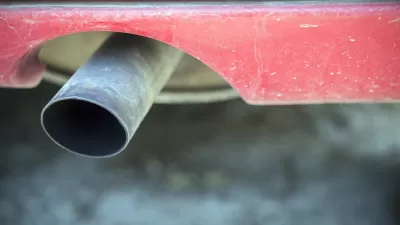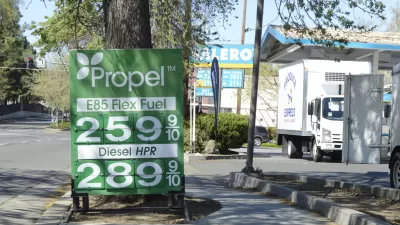At stake are greenhouse gas emission standards for 2022-25 model year passenger vehicles. Relaxing these standards would likely doom efforts to reduce these emissions 40 percent below 1990 levels by 2030 as required by 2016 state legislation.

"The [U.S. Environmental Protection Agency] faces an April 1 deadline to decide whether Obama-era corporate average fuel economy standards [CAFE] for cars and light trucks from 2022 to 2025 are attainable or should be revised," reports Bloomberg News. EPA Administrator Scott Pruitt has already dismissed a report issued by the Obama administration that led to the prior administration's rejection of a bid by automakers to reduce fuel economy standards in the midterm review.
Pruitt did not directly answer [during an interview with Bloomberg News on March 13] whether he would seek to revoke waivers from the federal law that allows California to set its own air pollution requirements. But he signaled his concern with California's outsize role.
"California is not the arbiter of these issues," Pruitt said. California regulates greenhouse gas emissions at the state level, "but that shouldn't and can't dictate to the rest of the country what these levels are going to be."
The stakes couldn't be higher for the California Air Resources Board (CARB), the powerful regulatory body charged with reducing greenhouse gas (GHG) emissions by 40 percent below 1990 levels by 2030. Transportation accounts for 39 percent of the state's GHG emissions. Worse yet, "increased fuel consumption in 2015 resulted in a 3 percent increase in emissions from the transportation sector," according to CARB, while emissions from other sectors have been decreasing.
According to Bloomberg, CARB officials offered to consider easing current GHG emission standards in exchange for extending them beyond that 2025, but Pruitt rejected their offer.
Winners and losers
While Calfornia will be the loser in a rejection of the EPA waiver by making by making it more difficult, if not impossible, to meet its SB 32 target, automakers, particularly those that manufacture light trucks, including the profitable and fuel-inefficient (compared to cars) full-sized SUVs, will be the winners.
Automakers aggressively lobbied Trump to take a new look at the standards, arguing that they need to be reviewed in light of surging light-truck sales, low gasoline prices and tepid demand for plug-in vehicles.
Shares of "Fiat Chrysler Automobiles NV, which has the most to gain as the U.S. automaker with the highest percentage of light trucks in its lineup, have more than doubled in value since Trump's election, in part on optimism that the automaker will be able to sell more Jeep SUVs and Ram pickups if the Trump administration rolls back standards set under Obama," adds Bloomberg.
- Reuters: "California-Trump administration fuel-efficiency talks intensify," Jan. 16, 2018
- Union of Concerned Scientists: "Pruitt’s EPA Attempts to Undermine California’s Leadership on Vehicle Standards," Feb. 2, 2018
Hat tip to Al Sattler via Sierra Club California Energy-Climate Committee.
FULL STORY: EPA chief signals a showdown with California over fuel economy rules for automakers

Planetizen Federal Action Tracker
A weekly monitor of how Trump’s orders and actions are impacting planners and planning in America.

Map: Where Senate Republicans Want to Sell Your Public Lands
For public land advocates, the Senate Republicans’ proposal to sell millions of acres of public land in the West is “the biggest fight of their careers.”

Restaurant Patios Were a Pandemic Win — Why Were They so Hard to Keep?
Social distancing requirements and changes in travel patterns prompted cities to pilot new uses for street and sidewalk space. Then it got complicated.

Albuquerque Route 66 Motels Become Affordable Housing
A $4 million city fund is incentivizing developers to breathe new life into derelict midcentury motels.

DC Area County Eliminates Bus Fares
Montgomery County joins a growing trend of making transit free.

Platform Pilsner: Vancouver Transit Agency Releases... a Beer?
TransLink will receive a portion of every sale of the four-pack.
Urban Design for Planners 1: Software Tools
This six-course series explores essential urban design concepts using open source software and equips planners with the tools they need to participate fully in the urban design process.
Planning for Universal Design
Learn the tools for implementing Universal Design in planning regulations.
Heyer Gruel & Associates PA
JM Goldson LLC
Custer County Colorado
City of Camden Redevelopment Agency
City of Astoria
Transportation Research & Education Center (TREC) at Portland State University
Camden Redevelopment Agency
City of Claremont
Municipality of Princeton (NJ)





























